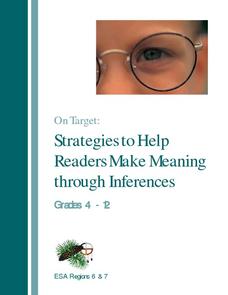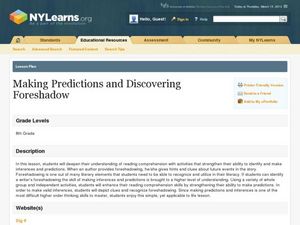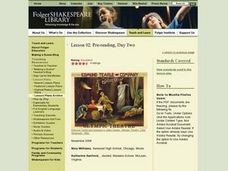Ministry of Education - Ontario
Reading Between the Lines
Learning to read between the lines, to recognize the on-the-surface meaning as well as the implied or inferred meaning of text, is an important skill for all readers. The materials and activities in this 73-page packet are designed to...
Teacher Web
Inferring Character Traits
Learning how to draw inferences from text is a key reading comprehension skill. Here's a worksheet that gives readers a chance to practice by offering 20 descriptive sentences and asking kids to identify the inferred character trait, and...
Curated OER
Shizuko’s Daughter: Selective Reading Guide
Examine the text of Kyoko Mori's Shizuko's Daughter with a reading guide. With questions that prompt kids to refer to the reading as well as to their own experiences and opinions, the guide is an effective way to keep them engaged with...
Curated OER
On Target: Strategies to Help Readers Make Meaning through Inferences
Here's a resource that explicitly teaches, models, and provides readers with opportunities to practice the process of drawing inferences from text. Packed with strategies elementary, middle, and high school teachers can use, the resource...
Curated OER
Using Pre-reading Strategies: Infer
Use this resource to support your class practicing inference with poetry and visual art. The plan calls for an examination of "The Scream" by Edvard Munch and the "Mona Lisa" to promote speculation about artist's intent. From there, it...
Curated OER
Analyzing Atmosphere: Macbeth Murder Scene and Dagger Speech
Shakespeare's Macbeth (Act II, Scenes I and II) lacks explicit details of the murder of King Duncan, yet the author creates an atmosphere that allows us to visualize the event. Readers interpret the "Dagger Speech" by writing stage...
K12 Reader
What Can You Infer?
Perhaps one of the most famous and illustrative stories featuring irony, "The Gift of the Magi" by O. Henry provides many opportunities for learners to make inferences about its characters. After reading a short introductory passage from...
Curated OER
Unwind: Directed Reading Thinking Activity
To generate interest in reading Neal Shusterman's young adult science fiction novel Unwind, class members engage in a Directed Reading-Thinking Activity (DRTA) that asks them to examine the front and back covers, the blurbs, and "The...
Penguin Books
Teacher’s Guide: Of Mice and Men by John Steinbeck
A 10-page guide to John Steinbeck's Of Mice and Men includes a brief plot summary, information about preparing readers for the language in the novel, pre-reading, during reading, and post-reading questions, essay prompts, and project...
Curated OER
Mini-Lesson: Planning for Inferences
The five lessons in this resource are designed to teach class members how to read between the lines, how to use personal experience/background knowledge/schema, along with the information in the text, to make assumptions about what is...
K20 LEARN
Here's How I Heard It: Using Folklore To Improve Close Reading Skills
"X" is for exaggeration, and "F" is for fact. To encourage close reading and to improve literary analysis skills, class members annotate fables and tall tales, like Paul Bunyan, with symbols that identify key features of this genre.
Curated OER
Tools of Persuasion
Ethos, pathos, and logos. After reading a passage about Aristotle's, three basic tools of persuasion, individuals answer a series of multiple choice comprehension questions and craft responses to three short-answer essay prompts.
Curated OER
Foreshadowing and Making Predictions
"What happens next?" Using real-life scenarios, movies, images, and other prompts, pupils practice making predictions based on inferences from clues. A SMART board activity takes them from making predictions to writing a prediction...
Curated OER
Shakespeare: Julius Caesar
Before your high schoolers read Julius Caesar, have them complete this thought-provoking activity! To familiarize them with some of the play's most important lines, break the class into pairs and have them create a skit around two lines...
Curated OER
To Kill a Mockingbird Study Guide Part II
Focus your class's reading of To Kill a Mockingbird with this resource. Eighty-three questions are provided for chapters 12-31, the majority of which focus on plot recall. Since this is a word document, you can consider adding questions...
Curated OER
"All Summer in a Day" by Ray Bradbury
After reading "All Summer in a Day," by Ray Bradbury, have your learners respond to these questions. The worksheet starts out with comprehension questions and moves into higher-level inference and judgment questions. This could be used...
Curated OER
"Monsters Are Due on Maple Street" by Rod Serling
These questions ask learners to think about the text "Monsters Are Due on Maple Street" in a variety of ways. In addition to practicing reading comprehension, class members work on interpreting, making inferences and connections,...
Curated OER
"The False Gems" by Guy de Maupassant
Readers must go beyond the surface level of Guy de Maupassant's story, "The False Gems," to answer the questions on this worksheet. They must draw inferences, evaluate character's actions, and analyze how irony and symbolism give depth...
Texas Education Agency (TEA)
Annotate and Analyze a Paired Passage: Practice 1 (English II Reading)
What do a colt and a boy in a tree have in common? More than might be first apparent. The fourth interactive in a series of ten introduces readers to intertextuality, the process of using abstract thinking to consider how one text...
Curated OER
During Reading Strategies (Inferring)
Students practice their reading skills. For this reading fluency and comprehension lesson, students read instructor-selected passages and use metacognitive skills to make inferences based on the selections.
Polk Bros Foundation
I Can Locate and Classify Information About a Topic
After reading a text, ask your pupils to recall and organize what they've just learned into a blank three-column chart. Class members write the topic and fill in the columns with information. The sheet also prompts students to write a...
Curated OER
Knights of the Round Table adapted by Gwen Ross
Everyone loves the tales involving King Arthur and his knights. After reading Knights of the Round Table by Gwen Gross, learners draw inferences and conclusions, analyze story elements, and discuss figurative language, including...
Academy of American Poets
Teach This Poem: "In the Next Galaxy" by Ruth Stone
Imagine what life might be like in a different galaxy. That's the challenge young scientists take on in a warm-up activity designed to prepare them for a close reading of Ruth Stone's poem "In the Next Galaxy." After class members share...
National Endowment for the Humanities
“Every Day We Get More Illegal” by Juan Felipe Herrera
A study of Jan Felipe Herrera's poem "Every Day We Get More Illegal" opens the door for a discussion on immigration. To begin, class members examine the photograph "Desert Survival," record their observations of the image, and then...
Other popular searches
- Making Inferences in Reading
- Making Inferences Reading
- Inferences in Reading
- Reading Inferences 4th Grade
- Reading Inferences 6th Grade
- Reading Inferences Poetry
- 1st Grade Reading Inferences
- Draw Inferences in Reading
- Reading Inferences Handouts
- Guided Reading Inferences
- Shared Reading Inferences
- Make Inferences Reading

























